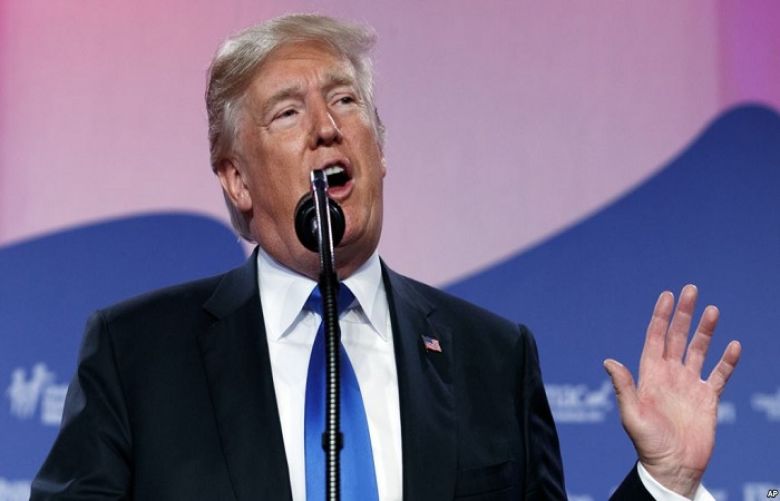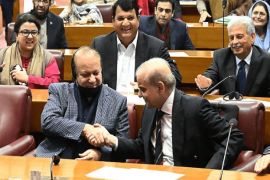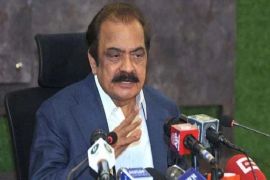Calling Iran the "world's leading state sponsor of terrorism" President Donald Trump announced that he would not certifying that Tehran was in compliance with the two-year old Iran nuclear agreement. Trump also called for a tough new approach to Iran, but stopped short of calling for the deal to be immediately scrapped. He did, however, say he would direct the U.S. Treasury Department to put new sanctions on Iran's Revolutionary Guard for sponsoring terrorism.
Briefing reporters on U.S. strategy in advance of Trump’s speech, Secretary of State Rex Tillerson emphasized that the president’s move does not alter the U.S. commitment to the 2015 deal Iran reached with the five permanent members of the United Nations Security Council and the European Union.
His action does, however, require Congress to re-consider the Iranian Nuclear Agreement Review Act (INARA), a U.S. law that requires the president to certify every 90-days that Iran is complying with the accord, called the Joint Comprehensive Plan of Action, or JCPOA.
“This is a much broader strategic approach than has been taken with Iran in the past,” Tillerson said. “The intent is that we will stay in JCPOA but the president is going to decertify under INARA.”
The secretary of state emphasized that the Trump administration would continue to live up to its commitments under the JCPOA, but is hopeful that Congress would strengthen its own law to include “trigger points’” that would automatically snap sanctions back into place should Iran violate the deal.
“Let's … amend the INARA to put in place some very firm trigger points,” Tillerson told White House reporters. “If Iran crosses any of these trigger points the sanctions automatically go back into place.
“These are trigger points that are specific to the nuclear program itself, but they also deal with things like the ballistic missile program,” he explained.
Tillerson, who is said to have been the chief architect of the new Iran strategy, says Congressional action to set trigger points would send a strong message of U.S. resolve to ensure Tehran does not develop nuclear weapons.
“That’s what the president has asked us to do. Either put more teeth into this obligation Iran has undertaken for all the benefits and the sanctions relief they have received…or let’s just forget the whole thing and we’ll walk away and we'll start all over,” he said.
While not touching the JCPOA, Tillerson said Trump would announce additional sanctions against Iran’s Revolutionary Guards for their support of terrorist actions in the region.
Opponents say move brings uncertainty
Trump has made no secret of his opposition to the deal since it was approved in 2015.But analysts and Obama administration officials involved in crafting the agreement say any attempt to tinker with it is fraught with numerous pitfalls, and will require close coordination with allies and lawmakers.
“This action is completely unnecessary and arbitrary,” said Ben Rhodes, who served as deputy national security advisor to President Obama. “The question at play in certification is whether or not Iran is complying with terms of nuclear deal, and as you know, the Trump administration itself has twice certified that Iran has complied with the nuclear deal. Iran is complying with the nuclear deal,” he said.
In a phone conversation with reporters Friday, Rhodes rejected the rationale for Trump’s strategy. “The approach they’ve urged Congress to take would constitute a violation of the deal because it would constitute an effort to unilaterally negotiate the deal.”
Robert Satloff, executive director of the Washington Institute for Near East Policy, called Trump’s refusal to certify Iran’s compliance with the JCPOA, “the most high profile element of a larger and generally welcome re-think of U.S. strategy to counter an aggressive Iran.”
Satloff worries, however, that the strategy could quickly go wrong. “To have an effective Iran strategy - requires not just strong declarations but rather careful management of relations with Congress, adroit diplomacy with our allies, and a credible threat of force. It is fair to say that at least the first two have not so far been the Trump Administration's strong suit," he said in a written comment to VOA.
Mark Fitzpatrick, executive director of the International Institute of Strategic Studies in Washington, said while Trump’s action will have no effect on the nuclear deal, it raises worrisome questions that will have to be answered on several fronts.
“How it will come out is very uncertain, given A: we don’t know what Congress will do; B: we don’t know the extent to which European states will protect their firms against secondary sanctions, and most importantly C, we don’t know how Iran will respond,” Fitzpatrick told VOA.
With few signs Iran is willing to modify its behavior, some say the U.S. must take a more aggressive approach to weaken Iran’s widening influence.
Next steps
The president’s action will give Congress 60 days to decide on a course of action. Their options include several possibilities, from re-imposing U.S. sanctions on Tehran to doing nothing.
The accord requires Tehran to sharply restrict its nuclear program and allow more access to international inspectors. Iranian leaders also promised not to seek, develop or acquire nuclear weapons. In return, Iran received relief from crippling economic sanctions, including the release of billions of dollars in frozen overseas assets and re-admittance to the international banking system.
White House Chief of Staff John Kelly told reporters Thursday that the president is “deep in thought, to say the least, about a way ahead in Iran,”. “He’s not the only one that thinks that maybe the deal that was struck under the previous administration is a deal that, in the long term, even in the medium and long term, will not protect America,” Kelly said.
“Iran is now a powerful nation state that remains the world’s largest state sponsor of terror,” CIA Director George Pompeo said on Thursday, adding that its intelligence and security ministry in the Islamic Revolutionary Guard Corps “are the cudgels of a despotic theocracy,” Kelly said.
Iran’s Foreign Minister, Mohammad Javad Zarif, pledged on Wednesday a "tougher" response if Trump finds Tehran not in compliance with the deal. An Iranian military spokesman further promised that his country’s forces would teach the U.S. "new lessons” if needed.







